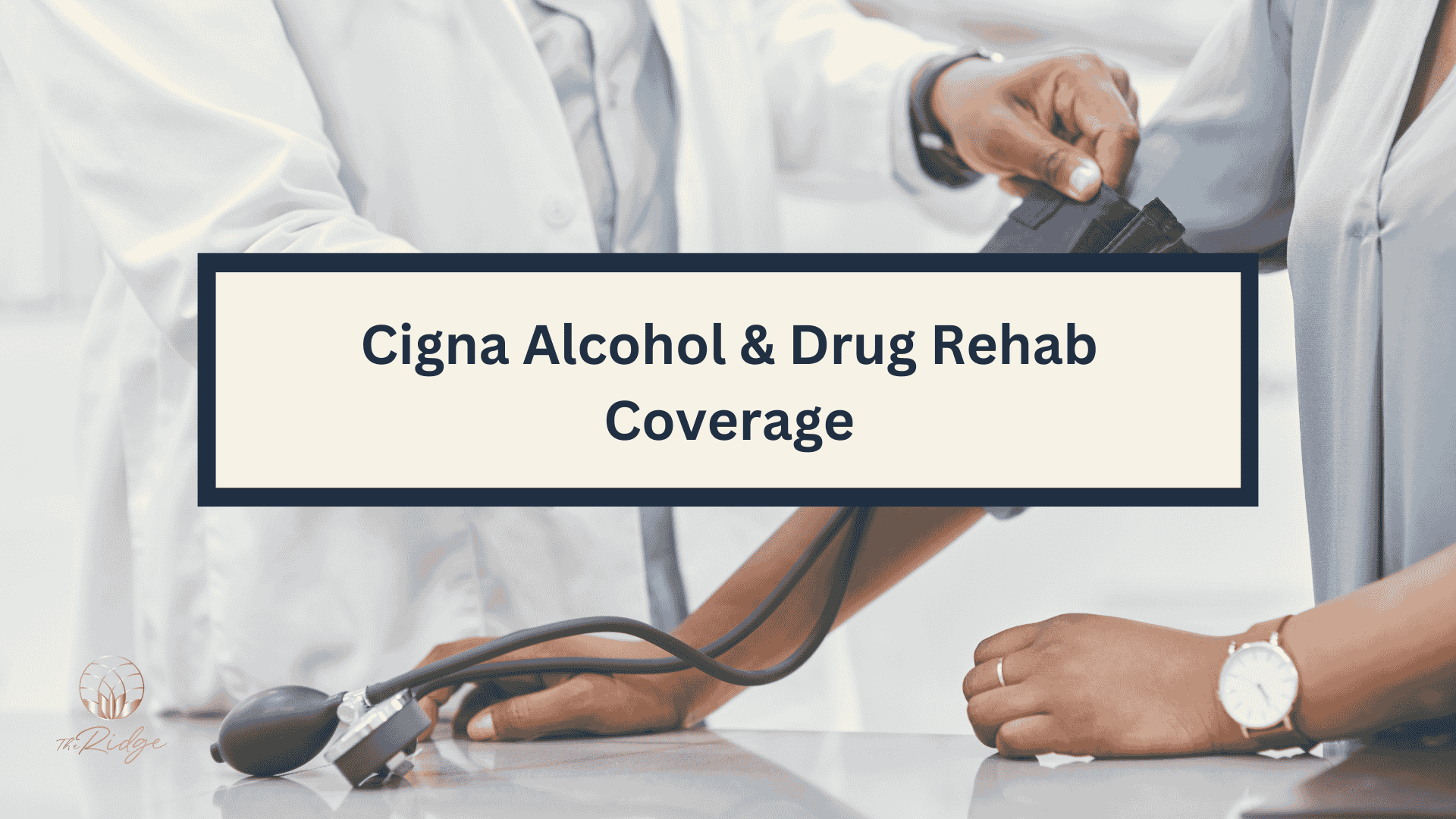- Home
- Blog
- Addiction Treatment
- Cigna Insurance Coverage for Alcohol and Drug Rehab
Cigna Insurance Coverage for Alcohol and Drug Rehab

- Home
- Blog
- Addiction Treatment
- Cigna Insurance Coverage for Alcohol and Drug Rehab

Table of Contents
Taking the first step toward recovery can feel overwhelming, but the right support can make all the difference. If you have health insurance through Cigna, you likely have coverage for alcohol and drug rehabilitation. Meaning support for you no matter which state you live in.
Cigna has plans to cover essential services like inpatient and outpatient care, detoxification, and therapy. Understanding your coverage is key to deciding and accessing the best treatment for you.
In this guide, we’ll explore what Cigna offers, including medically necessary services, partial hospitalization programs, pre-authorization requirements, co-pays, and deductibles. With the right information, you can take the next step toward recovery with confidence and peace of mind.
What is Cigna Insurance?
Cigna offers insurance plans that meet various healthcare needs, including health, dental, vision, disability, and Medicare coverage. Their network of providers spans across the globe.When it comes to recovery, having reliable insurance can ease the process. Cigna supports patients with personalized coverage options designed to help them get the care they need. Their focus on accessible solutions allows patients to take the next step toward improving their health.
Their reputation comes from their commitment to supporting individuals through challenging times. With an emphasis on affordability and tailored care, they help people access the treatments that work best for them.
What Does Cigna Cover for Rehab?
Cigna provides comprehensive coverage for substance abuse and substance use rehabilitation, offering services tailored to your needs. Cigna provides a menu of rehab services tailored to make you feel better. The plans include support for various types of treatment, ensuring access to essential care. Covered services typically include:
- Inpatient rehabilitation: Intensive care provided in a residential setting for severe cases of substance use disorders.
- Outpatient rehabilitation: Flexible programs allow you to attend therapy while maintaining daily responsibilities.
- Detoxification services: Medical supervision to manage withdrawal symptoms and stabilize you or your loved ones during the initial recovery phase.
- Therapy and counseling: Individual, group, or family sessions designed to address the underlying causes of substance abuse.
Cigna’s coverage varies depending on the specific insurance plan. Transitioning between services or combining them may optimize recovery outcomes. Always review your policy details and confirm coverage with Cigna to ensure you access the most appropriate rehabilitation options.
Inpatient and Outpatient Rehab Programs
Inpatient and outpatient rehab programs provide distinct treatment options for addressing substance use disorders. Inpatient programs offer intensive care in a controlled environment, ideal for severe cases requiring round-the-clock medical supervision. Outpatient programs, on the other hand, allow flexibility, enabling individuals to continue daily activities while attending scheduled treatment sessions.
Cigna covers both options, tailoring coverage to the plan’s specifics. Inpatient programs often include services such as:
- 24-hour medical care
- Structured therapy sessions
- Medication management
Outpatient programs typically cover:
- Individual and group counseling
- Family therapy sessions
- Relapse prevention programs
Cigna supports these treatment options to ensure effective care for different needs. Reviewing your plan helps clarify the services and providers it includes. Everyone’s recovery is unique, so make sure you check all of your options, whether it be drug or alcohol rehab.
With Cigna, you can choose the program that works best for your needs, whether you require the intensive care of inpatient rehab or the flexibility of outpatient treatment.
Pre-authorization Requirements
Cigna requires pre-authorization to approve specific treatment options before services begin It ensures that the recommended care is medically necessary and aligns with the insurance plan’s coverage. Cigna’s network includes locations that specialize in treating co-occurring disorders, ensuring comprehensive support during recovery. Without pre-authorization, providers might deny claims. To obtain pre-authorization for rehab services through Cigna:
- Contact Cigna’s customer service to confirm requirements for your treatment options.
- Provide details of the rehab program, including the facility and medical recommendations.
- Submit medical documentation from your healthcare provider.
- Wait for confirmation of approval, which typically includes a reference number.
- Follow up with the facility to confirm authorization and finalize arrangements.
Completing these steps ensures access to approved services while managing costs effectively, supporting an easier recovery journey.
Medically Necessary Services in Rehab
Cigna ensures that the treatments you need are covered so you can focus on healing. Cigna evaluates necessity based on medical evidence, the severity of the condition, and the likelihood of improving health outcomes. Services deemed unnecessary or non-therapeutic are typically excluded from coverage. Examples of medically necessary services include:
- Detoxification under medical supervision
- Individual or group therapy sessions
- Medication-assisted treatment (MAT)
Services typically not covered by insurance include:
- Alternative therapies without proven effectiveness
- Recreational activities at rehab facilities
- Costs unrelated to treatment, like luxury amenities
Understanding Cigna’s eligibility requirements for coverage helps in planning effective rehab treatment while avoiding unexpected expenses. Always consult your plan details and confirm with Cigna to ensure proper access to essential services.
Partial Hospitalization Programs (PHPs)
Partial Hospitalization Programs (PHPs) provide intensive treatment for individuals requiring structured care without full-time residential support. PHPs offer the perfect balance of support and independence, helping you regain your footing while staying connected to essential care.
These programs often include group therapy, individual counseling, and medication management. Professionals recommend PHPs for individuals who need a high level of care while maintaining some independence.
Cigna offers coverage for PHPs, supporting treatment plans tailored to the individual’s needs. Coverage typically includes therapy sessions, consultations with healthcare professionals, and necessary medications.
To access these benefits, patients should confirm that the chosen facility and services meet Cigna’s eligibility requirements. Verifying in-network providers can also help reduce out-of-pocket expenses. By understanding coverage details and working with healthcare professionals, you can effectively utilize PHPs for an easier and more efficient recovery process.
Detoxification
Detoxification is the very first step in addiction treatment. It helps you remove harmful substances from your body under medical supervision. This process prepares you for further recovery by addressing withdrawal symptoms and stabilizing your health.
Professionals monitor and guide patients through detox to ensure safety and comfort during this phase. Detox is important because it lays the foundation for a healthier life, free from dependency.
It involves medications, hydration, and emotional support to ease physical and mental stress. While detox does not treat the underlying causes of addiction, it creates the stability needed to continue therapy and long-term recovery. Seeking help from experienced professionals ensures the best outcomes during this vital stage.
Detox can be challenging, but it’s also a powerful first step toward a healthier, substance-free life. With the right care, you can get through this.
Mental Health and Co-Occurring Disorder Treatment
Treating co-occurring mental health disorders is vital in addiction recovery. These conditions, like anxiety or depression, can worsen substance use issues if left untreated. Addressing both simultaneously ensures a stronger path to long-term health and stability. Cigna recognizes this and offers coverage for essential treatments designed to manage these disorders effectively. Cigna typically covers the following mental health services for co-occurring disorders:
- Individual therapy sessions
- Group counseling for emotional support
- Medication management
- Cognitive Behavioral Therapy (CBT)
- Family therapy sessions
These services provide the support needed to treat underlying mental health challenges alongside addiction. Understanding your coverage options and working with healthcare providers helps you access the best resources for comprehensive care and recovery.
Does Cigna Cover Alcohol Rehab?
Yes, Cigna covers alcohol rehabilitation under specific conditions. Coverage depends on your insurance plan and the medical necessity of the treatment. Cigna includes a variety of treatment options, such as inpatient care, outpatient programs, and detoxification. These programs must be recommended by a healthcare provider to qualify for coverage.
For inpatient rehab, Cigna typically covers therapy, counseling, and medical monitoring. Outpatient programs often include counseling sessions and group therapy. Detoxification services are also covered to manage withdrawal safely.
To confirm your plan’s details and your eligibility, check for in-network providers and verify pre-authorization requirements. Knowing what your policy covers helps you access effective care while managing costs efficiently. Also, check all of your options for your alcohol rehab,
Cigna’s coverage can help you access the care you need to succeed. Don’t forget to consult Cigna for personalized assistance with your treatment needs.
Does Cigna Cover Drug Rehab?
Yes, Cigna provides coverage for drug rehabilitation services, including treatments for various substance use disorders. Coverage typically includes inpatient rehab, outpatient care, detoxification, and therapy. These services must meet medical necessity requirements and are often subject to pre-authorization.
Cigna’s coverage may vary based on the specific addiction being treated. For opioids, treatment often includes medication-assisted therapy (MAT) with drugs like Suboxone or Methadone. Stimulant addiction treatments, such as cocaine, may focus more on behavioral therapies and counseling sessions.
A disclaimer: each plan differs, so checking your specific policy and confirming coverage details with Cigna is very important. But, don’t stress yourself out, you are going to make it, just do so through small steps! Make sure you understand your options and get the right treatment and better recovery outcomes while managing costs effectively.
How Much of the Cost Does Cigna Cover for Addiction Treatment?
Cigna covers a significant portion of addiction treatment costs, but the exact amount depends on your insurance plan. Payments often include co-pays, deductibles, and coinsurance. The type of treatment and provider also affect coverage levels. In-network providers usually offer lower costs. On the other hand, out-of-network care involves higher out-of-pocket expenses. Factors that influence coverage include:
- In-network vs. out-of-network providers: In-network providers reduce costs significantly.
- Plan type: Coverage varies based on whether you have an HMO, PPO, or EPO plan.
- Treatment type: Inpatient, outpatient, IOP, and detox programs have different coverage percentages.
- Deductibles and co-pays: These determine how much you pay before coverage starts.
Confirming coverage details with Cigna and verifying providers ensures you understand the costs upfront, allowing for effective financial planning during treatment. Transitioning to in-network care maximizes savings and ensures better affordability.
How to Maximize Cigna Rehab Benefits
Cigna covers a significant portion of addiction treatment costs, but the exact amount depends on your insurance plan. Payments often include co-pays, deductibles, and coinsurance. The type of treatment and provider also affect coverage levels. In-network providers usually offer lower costs, while out-of-network care involves higher out-of-pocket expenses. Factors that influence coverage include:
- In-network vs. out-of-network providers: In-network providers reduce costs significantly.
- Plan type: Coverage varies based on whether you have an HMO, PPO, or EPO plan.
- Treatment type: Inpatient, outpatient, and detox programs have different coverage percentages.
- Deductibles and co-pays: These determine how much you pay before coverage starts.
Confirm the details with Cigna providers! This way you will understand the costs, and you will be able to plan out your budget! Moving to in-network care maximizes savings and ensures better affordability.
Verify Coverage with The Ridge Ohio
Verifying coverage with The Ridge Ohio is essential to minimize out-of-pocket expenses and maximize your Cigna benefits. To confirm coverage, follow these steps:
- Call The Ridge Ohio: Reach their admissions team at 844-237-3718 for assistance with insurance questions.
Taking these steps will help you understand your financial responsibilities and receive effective care without unexpected costs. Always confirm details before beginning treatment.
Understand Co-Pays, Deductibles, and Limits on Coverage
Understanding co-pays, deductibles, and coverage limits is key to managing rehab costs with Cigna health insurance. Co-pays are fixed amounts people pay for specific services, like therapy sessions or consultations. Deductibles are the amounts you must pay out-of-pocket before your insurance begins reimbursement costs. Coverage limits are caps on what your policy will pay for certain treatments, which could affect long-term rehab plans.
To optimize your benefits, confirm your co-pay and deductible requirements with Cigna. Knowing these details helps you plan your treatment costs effectively.
Contact Cigna’s customer service for assistance and ensure you fully understand your financial responsibilities. This knowledge empowers people to focus on recovery with fewer financial surprises.
Key Takeaways
Recovery takes time, but with the right support from Cigna and a clear plan, every small step leads to a brighter future. Here are the main points to keep in mind:
- Cigna provides comprehensive coverage for rehab treatment, including inpatient, outpatient, detox, and therapy services.
- Pre-authorization is very important to confirm eligibility and avoid denied claims. So, the whole process is easy and quick, but you need to take slow and calculated steps.
- Coverage levels depend on factors like co-pays, deductibles, and treatment type.
- Cigna also supports mental health services for co-occurring disorders and specific treatments for substances like opioids and stimulants.
- To maximize benefits, review your policy, seek advice from Cigna representatives, and confirm all requirements in advance.
So, give yourself time to understand each step of the way, whether you’re in Ohio or North Carolina, and what you should do to make it work. Always check your options and coverage limits to avoid unexpected expenses.
Frequently Asked Questions
Does Cigna cover therapy in rehab programs?
Yes, Cigna covers therapy in rehab programs. The specific types of therapy covered depend on your plan and the treatment setting.
To confirm your coverage, review your policy or contact Cigna directly. Verifying details ensures you can access the therapies needed for a successful recovery.
Is The Ridge Ohio in-network with Cigna?
Yes, Cigna provides coverage for rehab care, but costs differ based on whether the provider is in-network or out-of-network.
Does Cigna cover long-term rehab stays?
Yes, Cigna covers rehab stays, but the duration depends on your specific plan and medical necessity. Coverage typically varies between short-term and extended programs.
Short-term stays are often approved initially, with extensions requiring medical reviews. Providers must document progress and justify the need for continued care. Long-term stays may be covered if deemed necessary for recovery.
Are medications for detox covered under Cigna plans?
Yes, Cigna covers detox medications, but coverage depends on your plan and the prescribed treatment. Common medications include those for opioid and alcohol detox, like Methadone, Suboxone, and Naltrexone.





